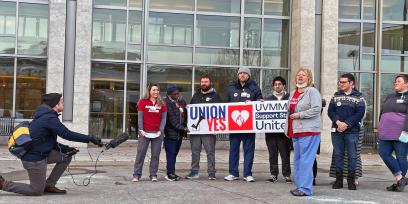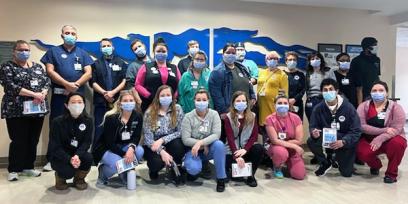Now that the support and technical staff at the University of Vermont Medical Center have joined the Vermont Federation of Nurses and Health Professionals/AFT Vermont, they are ready to negotiate their first contract. Staffing is one of the biggest priorities for health professionals, says Brett Rhodes, a licensed nursing assistant who has worked at the hospital for five years.
“The biggest thing is staffing. Patient care is suffering because of it,” says Rhodes. He wants their newly established union to fight for higher salaries, specifically a minimum wage of $20 per hour. "If we have a higher beginning wage, it will be easier to hire and retain employees.”
Recruiting and retention are something pharmacy tech Natalie Cartier would like to see addressed too. “We’re 10 people short, and the vacancies are noticeable. It makes for a stressful work environment.” Cartier would also like to see improvements in her department’s training. “I work with medication every day; it’s easy for things to slip through when someone isn’t properly trained.”
Negotiating for these things, she says, is part of advocating for improved patient safety and care.
On Feb. 4, the support and technical staff voted to join VFNHP/AFT Vermont after nearly a year of organizing. Cartier says she first considered unionizing after a particularly rough shift. “We had been discussing improvements with management and had been disregarded. That’s when I began discussing unionization with co-workers. We met with union representatives and people from other departments who were talking about the same thing.”
Indeed, Rhodes and other LNAs were discussing unionizing as well. “Everyone at the hospital was ready for change because they were tired of being called heroes and getting spit in the face,” he says.
The new bargaining unit includes a variety of support and technical staff such as licensed nursing assistants, lab and office assistants, pharmacy techs, food service, custodial workers and many others. The Vermont Federation of Nurses and Health Professionals, which already represents 2,500 healthcare professionals in the hospital, will nearly double in size by adding 2,200 more support and technical workers.
The nurses and techs who are already part of the union at the hospital helped with the organizing. Rhodes and Cartier say the nurses’ help and insight were invaluable. “The nurses advocated for us and had our backs,” says Cartier.
Rhodes describes organizing as a bit of a nightmare at first due to the many different types of support and technical staff involved. “It all worked out for the best,” he says. “The whole organizing process helped create solidarity. I’ve talked to so many people who brushed me off in the beginning and now they are flagging me down to talk about the union. It’s great to see everyone get excited about organizing.”
Cartier agrees. “The sense of community and genuine kindness of staff at UVM were wonderful. Knowing that all of us were advocating for patient care, while also challenging the status quo of our own treatment, was necessary. It helped everyone acknowledge our worth and passion for our patients.”
[Adrienne Coles]


